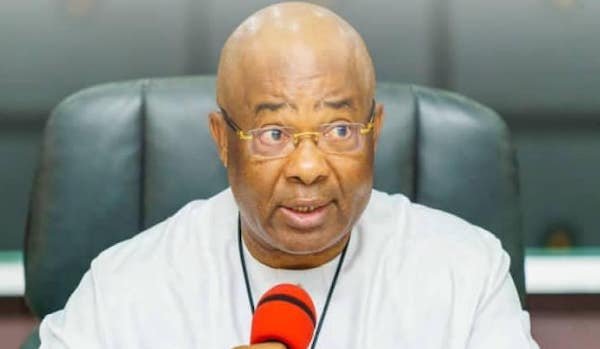The recent plunge in crude oil prices below $60 per barrel has raised significant concerns for Nigeria’s economy, particularly regarding the Naira’s stability and the widening budget deficit.
The crash in global crude oil prices in recent times has been driven by a combination of geopolitical, economic, and supply-demand factors.
Join our WhatsApp ChannelPrime Business Africa reports that oil prices fell to a four-year low of less than $60 per barrel in April, after members of the Organisation of Petroleum Exporting Countries and allies (OPEC+) agreed on a larger output increase for May. OPEC and allies led by Russia had been scheduled to raise output by 135,000 barrels per day in May, but after a meeting of the eight countries held online on Thursday, the group announced it would boost output by 411,000 bpd in May. According to a Reuters report, OPEC cited “continuing healthy market fundamentals and the positive market outlook.”
This unexpected oil output hike, which roiled the oil market, also came at a time when the U.S. President, Donald Trump, imposed tariffs on more than 90 countries across the globe, igniting concerns about global economic instability.

According to Oilprice.com, Western Texas Intermediate (WTI) Crude has dropped to $57.16 per barrel, while Brent Crude sold for $60.31 per barrel as of Monday evening.
Analysts say that for Nigeria, the effect of the fall in global crude oil prices has two sides. On one side, it could lead to lower prices of refined petroleum products, and on the other side is a drop in government revenue and pressure on the naira.
Pressure on the naira
A drop in crude oil prices in the international market leads to reduced dollar inflows as Nigeria relies heavily on oil exports for over 90 per cent of its foreign exchange earnings. Lower oil prices mean fewer dollars entering the economy, tightening liquidity in the forex market.
READ ALSO: Worries As Oil Price Crash, Low Production Threaten Nigeria’s 2025 Budget
Commenting on the development, Times Travelling Economist, Charles Robertson, said the outcome is not good for Nigeria and Angola. He highlighted that with both countries going for general elections in 2027, facing lower than expected oil prices, which could last all through this year and next, “there isn’t going to be some big revenue boost for the governments to help them win the 2027 elections, so it pressures their currencies,” Robertson stated in an interview on Channels Television’s Business Morning on Monday.
“For Nigeria, it is already putting pressure on the naira. It makes it harder for the naira to stay as strong as it is at the moment. I know it doesn’t just feel strong if you’re in Nigeria, but ₦1,600 or ₦2,000 per dollar becomes more likely where we are,” he further stated.
Depreciation Risks: Analysts expressed concerns that the Central Bank of Nigeria (CBN) may struggle to defend the Naira if foreign reserves deplete further. This could lead to a sharper devaluation in the official and parallel markets.
Increased Import Costs: A weaker Naira would make imports more expensive, worsening inflation.
Wider Budget Deficit
Revenue Shortfall: The ₦54.99 trillion 2025 budget was benchmarked at $75 per barrel. The latest trend of crude oil prices falling below $60, which is more than $15 per barrel short of the benchmark, means the government will earn far less than what was projected as revenue in this year’s budget. While the increase in output means Nigeria may benefit from increasing its 1.5 million quota allocated by OPEC+, the effect of a further drop in oil price will, according to analysts, affect the government’s plan to generate about ₦84.67 trillion from the sale of crude oil in 2025.
Higher Borrowing Needs: There are concerns that with oil revenues shrinking, Nigeria may need to increase borrowing to fund critical expenditures, raising the deficit beyond the projected ₦13.08 trillion (3.89 per cent of GDP).
Debt Servicing Challenges: Nigeria already spends a large portion of its revenue on debt servicing. About ₦16 trillion was earmarked for that in the 2025 budget. Lower oil income could push the debt-to-GDP ratio higher, risking fiscal instability.
Economic Growth Concerns
Lower revenues may force significant cuts in capital projects, slowing economic growth.
FX Scarcity & Business Constraints: Manufacturers and businesses dependent on imported inputs could face higher costs, leading to lower productivity and potential job losses.
Possible Mitigation Strategies
Diversification of the economy: Faced by the threat of lower oil prices, a country like Nigeria that heavily depends on oil for FX earnings has no option but to diversify its revenue sources for sustainability, said Robertson. According to him, the government may have to accelerate non-oil sector development, such as agriculture, manufacturing, and tech, among others, to reduce oil dependency.
Speaking on diversification, economic analyst, Mr Chika Mbonu, said Nigeria has always had the agenda in its development plans, but often swept it under the carpet once the price of oil rises in the international market. While acknowledging that the Federal Government has in recent times been emphasising expanding the income base in the non-oil sector, Mr Mbonu pointed out that it is yet to identify the limiting factors and address them. “We have been talking about the expansion of non-oil exports, but nobody goes to address the fundamental problems that they have. The problem remains the same, season and out of season,” Mbonu stated when he appeared on Arise News Global Business Report on Monday.
READ ALSO: We Need Economic Diversification To Save Naira’s Value – 9mobile CEO
FX Policy Adjustments: The CBN could further devalue the naira or introduce new forex controls to manage demand.
Revised Budget Benchmarks: Analysts hinted at a possible adjustment of the budget assumptions, if low oil prices persist, and also seek alternative financing, like IMF loans, and Eurobonds, among others.
Minister of Finance and Coordinating Minister of the Economy, Wale Edun, had while reacting to the proposed tariff hike by the U.S. president, said Nigeria would take a second look at the 2025 budget assumptions.
Victor Ezeja is a passionate journalist with seven years of experience writing on economy, politics and energy. He holds a Master's degree in Mass Communication.













